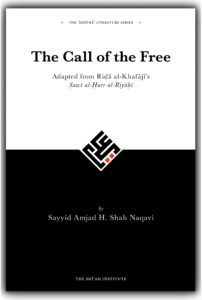The Call of the Free
An adaptation of Riḍā al-Khafājī’s Ṣawt al-Ḥurr al-Riyāḥī
by Sayyid Amjad H. Shah Naqavi
The first volume published in The Shīʿah Institute’s ʿĀshūrāʾ Literature Series, The Call of the Free portrays the events leading up to the massacre of the grandson of the Prophet Muḥummad, Imām al-Ḥusayn b. ʿAlī, his family, and his companions, peace be upon them, at Karbala on the day of ʿĀshūrāʾ in 61/680, as seen through the eyes of al-Ḥurr al-Riyāḥī, a man caught between his duties as a soldier of the Umayyad Caliphate and the stirring of his conscience. The last-minute defection of al-Ḥurr al-Riyāḥī to the cause of Imām al-Ḥusayn is a well-known and celebrated aspect of the events of Karbala. In Ṣawt al-Ḥurr al-Riyāḥī, a work composed in 1988 but not published in the original Arabic until 2001, the Iraqi poet and playwright Riḍā al-Khafājī invigorates the historical narrative of al-Ḥurr al-Riyāḥī’s defection and the turmoil of his conscience, by introducing the character of The Caller – a mysterious voice from the unseen. This adaptation into English by the Dean of the Shīʿah Institute, Dr Sayyid Amjad H. Shah Naqavi, seeks to introduce the poetry in honour of ʿĀshūrāʾ to the Anglophone world, offering the reader an insight into the rich literary tradition of commemoration and mourning rituals surrounding the lamentation of the massacre at Karbala. This heritage constitutes a living, dynamic tradition that continually recasts a consistent and timeless narrative – with a common emotional core – according to the idiosyncratic styles and approaches of individual communities and their audiences.
Given the importance of this tradition, The Call of the Free, adapted by Dr Sayyid Amjad H. Shah Naqavi is not a word-for-word translation but rather a poetic adaptation that makes this key text more lucid and more lyrical for an English-speaking readership, whilst still retaining the elevated tone and the sense of timeless gravity associated with literary commemorations of the events of Karbala. Drawing upon his expertise in both Arabic philology and English literary translation, Dr Sayyid Amjad H. Shah Naqavi’s adaptation uses blank verse – unrhymed iambic pentameter, the pre-eminent poetic form in English literature since the sixteenth century – to give fluent voice and do ample justice to Ṣawt al-Ḥurr al-Riyāḥī in the way a simple prose translation could not. As well as the stately, steady, five-beat grandeur of blank verse, some sections of The Call of the Free are also composed in the alliterative verse characteristic of Old English poetry (and best known from the Anglo-Saxon epic Beowulf), as well as forms inspired by traditional Arabic poetic modes, including the ode (qaṣīdah) and the threnody (nawḥah). In The Call of the Free, Dr Sayyid Amjad H. Shah Naqavi presents a work of literary beauty that will be of interest to scholars, students, lovers of literature, and general readers alike. The Call of the Free is a fine work of poetry that makes a major contribution to ʿĀshūrāʾ literature and the commemoration of Karbala.
The Call of the Free is available to purchase, please email the institute to order your copy.
ISBN: 978-0-9935884-1-9 (Hardback)

